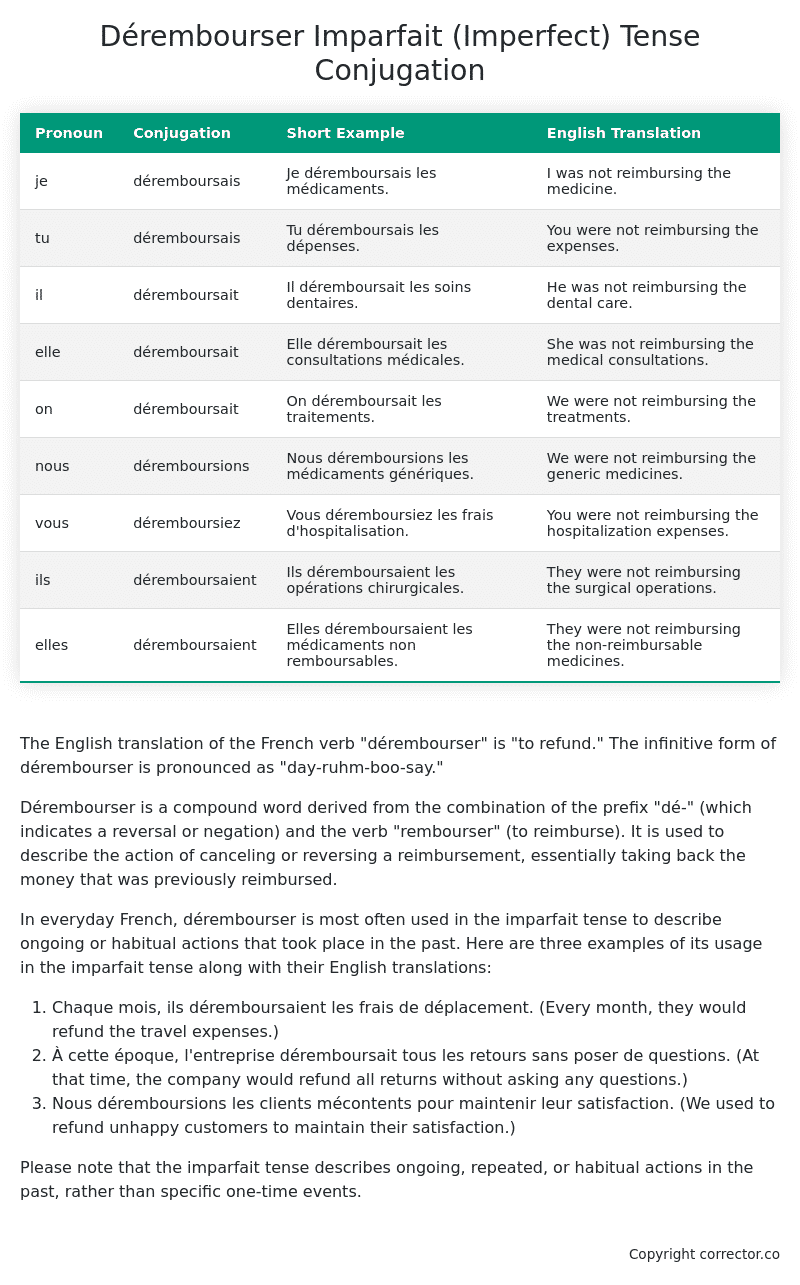Imparfait (Imperfect) Tense Conjugation of the French Verb dérembourser
Introduction to the verb dérembourser
The English translation of the French verb “dérembourser” is “to refund.” The infinitive form of dérembourser is pronounced as “day-ruhm-boo-say.”
Dérembourser is a compound word derived from the combination of the prefix “dé-” (which indicates a reversal or negation) and the verb “rembourser” (to reimburse). It is used to describe the action of canceling or reversing a reimbursement, essentially taking back the money that was previously reimbursed.
In everyday French, dérembourser is most often used in the imparfait tense to describe ongoing or habitual actions that took place in the past. Here are three examples of its usage in the imparfait tense along with their English translations:
- Chaque mois, ils déremboursaient les frais de déplacement. (Every month, they would refund the travel expenses.)
- À cette époque, l’entreprise déremboursait tous les retours sans poser de questions. (At that time, the company would refund all returns without asking any questions.)
- Nous déremboursions les clients mécontents pour maintenir leur satisfaction. (We used to refund unhappy customers to maintain their satisfaction.)
Please note that the imparfait tense describes ongoing, repeated, or habitual actions in the past, rather than specific one-time events.
Table of the Imparfait (Imperfect) Tense Conjugation of dérembourser
| Pronoun | Conjugation | Short Example | English Translation |
|---|---|---|---|
| je | déremboursais | Je déremboursais les médicaments. | I was not reimbursing the medicine. |
| tu | déremboursais | Tu déremboursais les dépenses. | You were not reimbursing the expenses. |
| il | déremboursait | Il déremboursait les soins dentaires. | He was not reimbursing the dental care. |
| elle | déremboursait | Elle déremboursait les consultations médicales. | She was not reimbursing the medical consultations. |
| on | déremboursait | On déremboursait les traitements. | We were not reimbursing the treatments. |
| nous | déremboursions | Nous déremboursions les médicaments génériques. | We were not reimbursing the generic medicines. |
| vous | déremboursiez | Vous déremboursiez les frais d’hospitalisation. | You were not reimbursing the hospitalization expenses. |
| ils | déremboursaient | Ils déremboursaient les opérations chirurgicales. | They were not reimbursing the surgical operations. |
| elles | déremboursaient | Elles déremboursaient les médicaments non remboursables. | They were not reimbursing the non-reimbursable medicines. |
Other Conjugations for Dérembourser.
Le Present (Present Tense) Conjugation of the French Verb dérembourser
Imparfait (Imperfect) Tense Conjugation of the French Verb dérembourser (You’re reading it right now!)
Passé Simple (Simple Past) Tense Conjugation of the French Verb dérembourser
Passé Composé (Present Perfect) Tense Conjugation of the French Verb dérembourser
Futur Simple (Simple Future) Tense Conjugation of the French Verb dérembourser
Futur Proche (Near Future) Tense Conjugation of the French Verb dérembourser
Plus-que-parfait (Pluperfect) Tense Conjugation of the French Verb dérembourser
Passé Antérieur (Past Anterior) Tense Conjugation of the French Verb dérembourser
Futur Antérieur (Future Anterior) Tense Conjugation of the French Verb dérembourser
Subjonctif Présent (Subjunctive Present) Tense Conjugation of the French Verb dérembourser
Subjonctif Passé (Subjunctive Past) Tense Conjugation of the French Verb dérembourser
Subjonctif Imparfait (Subjunctive Imperfect) Tense Conjugation of the French Verb dérembourser
Conditionnel Présent (Conditional Present) Tense Conjugation of the French Verb dérembourser
Conditionnel Passé (Conditional Past) Tense Conjugation of the French Verb dérembourser
Conditionnel Passé II (Conditional Past II) Tense Conjugation of the French Verb dérembourser
L’impératif Présent (Imperative Present) Tense Conjugation of the French Verb dérembourser
L’impératif Passé (Imperative Past) Tense Conjugation of the French Verb dérembourser
L’infinitif Présent (Infinitive Present) Tense Conjugation of the French Verb dérembourser
L’infinitif Passé (Infinitive Past) Tense Conjugation of the French Verb dérembourser
Le Participe Présent (Present Participle) Tense Conjugation of the French Verb dérembourser
Le Participe Passé (Past Participle) Tense Conjugation of the French Verb dérembourser
Struggling with French verbs or the language in general? Why not use our free French Grammar Checker – no registration required!
Get a FREE Download Study Sheet of this Conjugation 🔥
Simply right click the image below, click “save image” and get your free reference for the dérembourser imparfait tense conjugation!

Dérembourser – About the French Imparfait Tense
NOTE: To take a deep dive into all the French tenses then see our article on Mastering French Tense Conjugation.
Formation of the Imparfait Tense
For regular -er verbs:
For regular -ir verbs
For regular -re verbs
Common Everyday Usage Patterns
Description of Past Habits
Background Information
Mental and Emotional States
It’s employed to express emotions, thoughts, or physical sensations in the past. For example: “J’étais content quand il est arrivé.” (I was happy when he arrived.)
Ongoing Actions
Points to Note About the Imparfait Tense
Passé Composé vs. Imparfait
Conditional
Si Clauses
Narration
I hope you enjoyed this article on the verb dérembourser. Still in a learning mood? Check out another TOTALLY random French verb imparfait conjugation!


